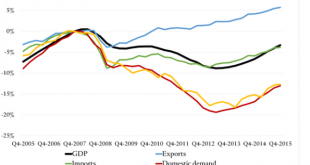from Dean Baker Paul Krugman devoted his column on Friday to a mild critique of the drive to take the United Kingdom out of the European Union. The reason the column was somewhat moderate in its criticisms of the desire to leave EU is that Krugman sympathizes with the complaints of many in the UK and elsewhere about the bureaucrats in Brussels being unaccountable to the public. This is of course right, but it is worth taking the issue here a step further. If we expect to hold people...
Read More »Practical economics is radical?
from Peter Radford I have a book by James Meade published in 1975. It’s called “The Intelligent Radical’s Guide to Economic Policy”. Thumbing through it reveals how some things never change and yet, also, how the neoliberal suffocation of economic thinking and policy has allowed us to drift from a socially just economy. He ends his first paragraph thus: “The radical in politics is the citizen who places a rather high relative value upon Liberty and Equality in the catalogue of social...
Read More »Creating full employment
from Asad Zaman We are used to thinking that there is progress in knowledge. As we gain experience, the collective wisdom of mankind increases. The story of economics in the twentieth century provides the most amazing example of the opposite: How precious knowledge of vital importance for the welfare of humanity was gained and then lost. Many studies show that a meaningful job is the most important determinant of life satisfaction, and among the thing most desired by the general...
Read More »Brad Setser on jobs and domestic demand in Spain
On the CFR blog Brad Setser has an interesting post about Spain, based upon the Spanish national accounts.. Summary: it is going better but (the volumes of) domestic demand and jobs are still 10% below the 2007 level. And despite a relatively favorable development of (net) exports domestic demand seems to explain about everything, when it comes to employment. I have three points to add. The difference between the development of GDP and the development of domestic demand is, when it...
Read More »Bringing the Troika to Paris
from Mark Weisbrot I have argued for years, and in my last post on this blog, that a big part of the story we have seen in Europe over the past eight years is a result of social engineering. This has involved a major offensive by the European authorities, taking advantage of an economic crisis, to transform Europe into a different kind of society, with a smaller social safety net, lower median wages, and — whether intended or not — increasing inequality as a result. In recent...
Read More ȣ4.6 million of funding for non-mainstream research: Town Meeting: London, 28 June 2016: proposals invited
Registration for the event closes tomorrow at 23.59 “Proposals will be invited to lead, develop and administer a single Network Plus, with funding available of up to £4.6 million (100 per cent fEC) over 48 months, . . . “ Attendance at the event is not a requirement for submitting a proposal, but is strongly advised. Primary link: Understanding the Macroeconomy Network Plus Background Longstanding criticisms of the economics profession, and particularly of the dominant paradigm in...
Read More »Links for today. Deflation delusionalists
I was pleasantly surprised by this informed and moderate speech by Mario Draghi (though I do not agree with his suggestion that structural employment is 9,7%…). But then I read Billy Blog about the latest ridiculous nonsense by the European Commission (sanctioned by the ECB) and I was reminded that economic economic insanity lurks, well, not around the corner but has centre stage: “When policy becomes so distorted that nations with rampant deflation and elevated levels of unemployment...
Read More »Shorter workweeks will defeat the robots
from Dean Baker More than eight years after the start of the Great Recession, our labor market is far from recovering by most measures. At 5 percent, the current unemployment rate is not very different from its pre-recession level, but the main reason it is so low is that millions of people have given up looking for work and dropped out of the labor force. These people are no longer counted as being unemployed. And contrary to what is often claimed, this is not a story of retiring baby...
Read More »Bachaqueros and the distinction between productive and unproductive labor
from David Ruccio Every economic theory includes—or, at least, is haunted by—the distinction between productive and unproductive labor. The distinction serves as the basis of all their major claims, from the most basic theory of value to the conception of who deserves what within capitalism. The distinction began with the French Physiocrats, especially François Quesnay, who in his 1758 Tableau Économique made a distinction between the “Productive” Class (which consisted of agricultural...
Read More »The empirics of Noah-macro
In an interesting and highly readable recent Bloomberg blogpost Noah Smith distinguishes 4 kinds of macro: coffee-house macro, financial macro, academic macro and Fed macro. I like to add ’empirical macro’, i.e. the National Accounts, but that’s for another occasion as I just ran into a blogpost by Olivier Blanchard and a speech by Mario Draghi which nicely illustrate the differences between two of Noah’s macro’s, i.e. academic macro and what I want to rename ‘central bank’ macro (sorry,...
Read More » Real-World Economics Review
Real-World Economics Review


